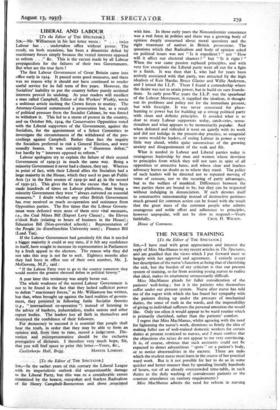. [To the Editor of THE SPECTATOR.]
SIR,—In the earlier years of this century the Liberal League ,with its imperialistic outlook did unquestionable damage to the Liberal Party, but this was to a considerable extent minimised by the honest, outspoken and fearless Radicalism of Sir Henry Campbell-Bannerman and those associated with him. In those early years the Nonconformist conscience was a real force in politics and there was a growing body of opinion deeply concerned about moral questions and the right treatment of natives in British possessions. The questions which that Radicalism and body of opinion asked
on political issues was not " Is it expedient ? " not " How will it affect our electoral chances ? " but Is it right ? " When the war came passion replaced principles, and with very few exceptions the Liberal party went all out for a fight to a finish. It was then that I, who had for years been actively associated with that party, was attracted by the high idealism of Keir Hardie, Bruce Glasier and Willie Anderson, and I joined the I.L.P. There I found a comradeship where the desire was not to attain power, but to build on sure founda- tions. In early post-War years the I.L.P. was the spearhead of the Labour Movement, it supplied the idealism, it thought out its problems and policy not for the immediate present,' but with foresight. It was never concerned for place- hunting or power but for building up a strong political party with clean and definite principles. It avoided what is so dear to many Labour supporters today, catch-cries, sensa- tionalism and what appears to be momentarily popular. And when defeated and ridiculed it went on quietly with its work and did not indulge in the present-day practice, so congenial to some would-be leaders, of seeing Labour in power a very little way ahead, whilst quite unconscious of the growing anxiety and disappointment of the rank and file.
What is needed in Labour and Liberal parties today is courageous leadership by men and women whose devotion to principles from which they will not turn in spite of all opposition or attractive lures, and whose clear and fearless advocacy leaves no doubt as to where they stand. The policy of such leaders will be directed not to repeated moving of votes of censure, nor to the securing of party advantages, but to the welfare of mankind. Differences between the two parties there are bound to be, but they can be respected without indulging in denunciation. If each devotes itself to constructive statesmanship instead of destructive pettiness much ground for common action can be found with the result that the great mass of the common people who admire courageous and noble effort and adherence to principles, however unpopular, will not be slow to respond.—Yours






































 Previous page
Previous page